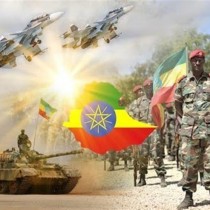ALSO IN THE NEWS

The U.N. and Ethiopia agree on humanitarian access
The U.N. and Ethiopia agree on humanitarian access, IDB's president pledges cooperation with Joe Biden's White House, and the U.N. presents its "bleakest and darkest" humanitarian overview. This week in development:
The United Nations signed a deal with the government of Ethiopia on Wednesday to allow humanitarian access into the country's Tigray region, which has been caught in a deadly power struggle between federal and regional forces. On Saturday, the government announced that it had taken "full control" of the region's capital city, Mekele, and declared victory in a military offensive that has lasted more than four weeks, displaced nearly 1 million people, and resulted in unknown numbers of deaths, including among civilians. An estimated 45,000 people have fled Ethiopia for neighboring Sudan, while Eritrean refugees living in camps near Ethiopia's northern border have suffered reported attacks from Eritrean forces siding with the federal government. The conflict has left humanitarian organizations waiting on the sidelines for an opening to deliver aid amid reports of rising food insecurity and deteriorating health services, particularly among refugees. The new deal will allow "unimpeded" access to areas under federal control within the region, but experts cautioned that while the active military phase might be over, the fighting is not. They warned the danger now is that the conflict could turn into a long-term insurgency. On Wednesday, Reuters reported that four Ethiopian aid workers were killed during the fighting last month at one of the Eritrean refugee camps. Their identities have not been disclosed, and the exact circumstances of their deaths are still unknown, due in large part to a communications blackout across the region.
The president of the Inter-American Development Bank is eager to cooperate with U.S. President-elect Joe Biden's incoming administration, he told Devex. Mauricio Claver-Carone, a former member of President Donald Trump’s National Security Council who became the first American to be nominated and elected as president of IDB, was quick to congratulate Biden on his victory and said he looks forward to showing that he and the White House can "put political partisan differences aside." Biden opposed Claver-Carone's candidacy on the grounds that it broke with the precedent of IDB presidents coming from the Latin America and Caribbean region. Claver-Carone has pledged to serve only a single term, and he has put plans to secure a capital increase for the institution at the center of his presidency. Doing so will require support from the Biden administration, including newly named Treasury Secretary nominee Janet Yellen. "I take President-elect Biden at his word when he talked about us coming together, for the nation healing, and for us working in a bipartisan fashion," Claver-Carone told Devex. When he served as vice president in Barack Obama's administration, Biden was centrally involved in crafting the Alliance for Prosperity, a plan for the Northern Triangle countries of El Salvador, Guatemala, and Honduras to spur development and economic growth and to decrease migration to the U.S. border. Claver-Carone hopes to collaborate with Biden's White House on "Alliance for Prosperity 2.0." "I have a copy in my desk ready to present to them for their review," he said.
The United Nations' humanitarian branch is warning that 2021 presents the "bleakest and darkest" picture of global response needs in history, due to continued and worsening fallout from the COVID-19 pandemic. The U.N. Office for the Coordination of Humanitarian Affairs released its "Global Humanitarian Overview 2021" this week. It calls for $35.1 billion to reach more than 235 million people — or 1 in 33 worldwide who now require lifesaving assistance — representing a 40% increase in the number of people needing assistance compared with last year. "That is a reflection of the fact that the COVID pandemic has wreaked havoc across the whole of the most fragile and vulnerable countries on the planet, those where humanitarians are involved in their day-to-day work," Mark Lowcock, the U.N. emergency chief, told reporters. The overview raises particular concerns about increases in food insecurity around the world, including the imminent risk of famine in Yemen, Burkina Faso, northeastern Nigeria, and South Sudan. And it points to new conflict outbreaks in Nagorno-Karabakh, Mozambique, and northern Ethiopia, on top of protracted crises elsewhere that have seen little improvement. "Things are just as bad in the biggest humanitarian settings as they were a year ago," Lowcock said.
Leave a comment
| Copyright © 2009 - 2026 Sunatimes News Agency All Rights Reserved. |
| Home | About Us | Diinta | Reports | Latest News | Featured Items | Articles | Suna Radio | Suna TV | Contact Us |
 0
0 









The U.N. and Ethiopia agree on humanitarian access
The U.N. and Ethiopia agree on humanitarian access, IDB's president pledges cooperation with Joe Biden's White House, and the U.N. presents its "bleakest and darkest" humanitarian overview. This week in development: The United Na